For the 2025 school year, there are 2 public preschools serving 355 students in West Point Consolidated School District. This district's average pre testing ranking is 4/10, which is in the bottom 50% of public pre schools in Mississippi.
Public Preschools in West Point Consolidated School District have an average math proficiency score of 35% (versus the Mississippi public pre school average of 43%), and reading proficiency score of 35% (versus the 43% statewide average).
Minority enrollment is 89% of the student body (majority Black), which is more than the Mississippi public preschool average of 55% (majority Black).
Overview
This School District
This State (MS)
# Schools
8 Schools
282 Schools
# Students
2,549 Students
125,600 Students
# Teachers
208 Teachers
10,006 Teachers
Student : Teacher Ratio
13:1
13:1
District Rank
West Point Consolidated School District, which is ranked within the bottom 50% of all 148 school districts in Mississippi (based off of combined math and reading proficiency testing data) for the 2021-2022 school year.
The school district's graduation rate of 88% has increased from 85-89% over five school years.
Overall District Rank
#98 out of 148 school districts
(Bottom 50%)
(Bottom 50%)
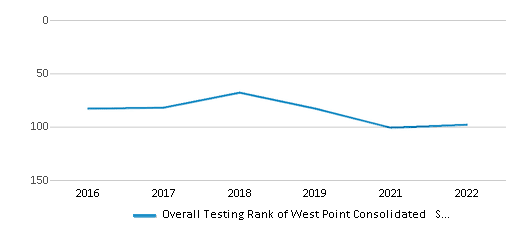
Math Test Scores (% Proficient)
32%
47%
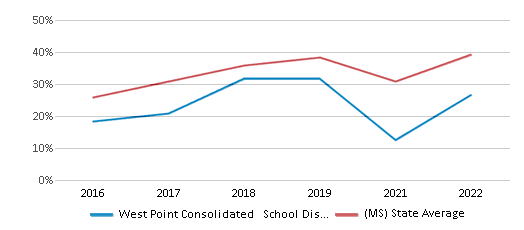
Reading/Language Arts Test Scores (% Proficient)
28%
42%
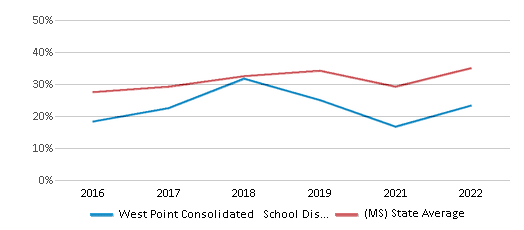
Science Test Scores (% Proficient)
47%
55%
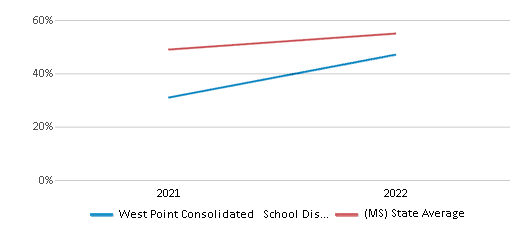
Graduation Rate
88%
89%
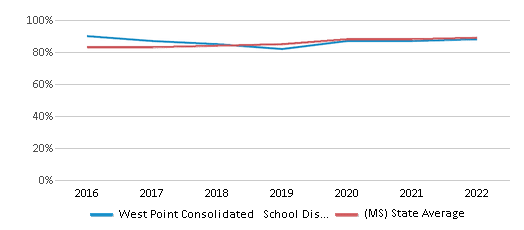
Students by Ethnicity:
Diversity Score
0.30
0.60
# American Indian Students
2 Students
282 Students
% American Indian Students
n/a
n/a
# Asian Students
9 Students
834 Students
% Asian Students
n/a
1%
# Hispanic Students
34 Students
5,432 Students
% Hispanic Students
1%
4%
# Black Students
2,101 Students
56,691 Students
% Black Students
83%
45%
# White Students
358 Students
55,982 Students
% White Students
14%
45%
# Hawaiian Students
2 Students
66 Students
% Hawaiian Students
n/a
n/a
# Two or more races Students
43 Students
6,313 Students
% of Two or more races Students
2%
5%
Students by Grade:
# Students in PK Grade:
68
9,221
# Students in K Grade:
191
22,360
# Students in 1st Grade:
203
22,172
# Students in 2nd Grade:
191
19,400
# Students in 3rd Grade:
177
14,702
# Students in 4th Grade:
151
13,066
# Students in 5th Grade:
134
10,676
# Students in 6th Grade:
185
4,243
# Students in 7th Grade:
161
1,742
# Students in 8th Grade:
187
1,709
# Students in 9th Grade:
242
1,025
# Students in 10th Grade:
196
986
# Students in 11th Grade:
218
953
# Students in 12th Grade:
172
827
# Ungraded Students:
73
2,518
District Revenue and Spending
The revenue/student of $13,227 is higher than the state median of $12,205. The school district revenue/student has grown by 12% over four school years.
The school district's spending/student of $12,622 is higher than the state median of $12,074. The school district spending/student has grown by 12% over four school years.
Total Revenue
$34 MM
$5,371 MM
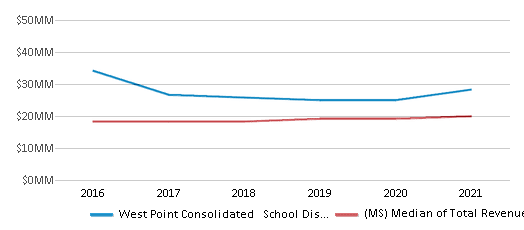
Spending
$32 MM
$5,314 MM
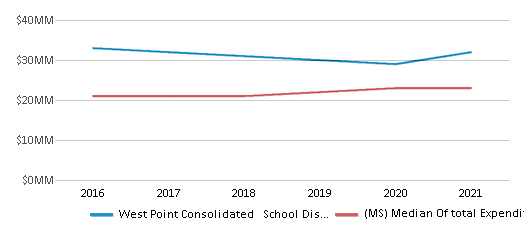
Revenue / Student
$13,227
$12,205
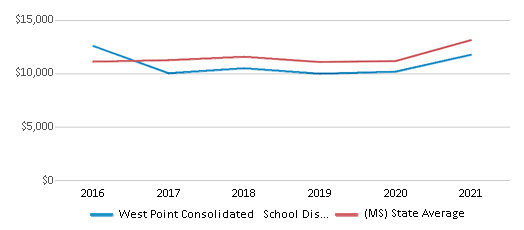
Spending / Student
$12,622
$12,074
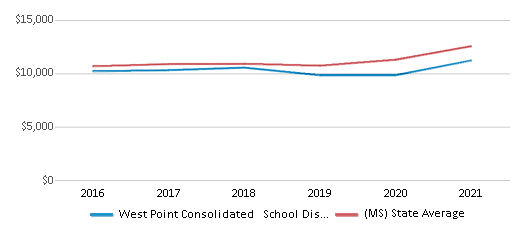
Best West Point Consolidated School District Public Preschools (2025)
School
(Math and Reading Proficiency)
(Math and Reading Proficiency)
Location
Grades
Students
Rank: #11.
West Clay Elementary School
(Math: 30-39% | Reading: 30-39%)
Rank:
Rank:
4/
Bottom 50%10
450 Joe Stevens Road
West Point, MS 39773
(662) 494-2350
West Point, MS 39773
(662) 494-2350
Grades: PK-6
| 101 students
Rank: n/an/a
1039 E Broad Street
West Point, MS 39773
(662) 494-4691
West Point, MS 39773
(662) 494-4691
Grades: PK-K
| 254 students
Recent Articles

Year-Round Or Traditional Schedule?
Which is more appropriate for your child? A year-round attendance schedule or traditional schedule? We look at the pros and cons.

Why You Should Encourage Your Child to Join a Sports Team
Participating in team sports has a great many benefits for children, there is no doubt. In this article you will learn what those benefits are.

White Students are Now the Minority in U.S. Public Schools
Increasing birth rates among immigrant families from Asia and Central and South America, combined with lower birth rates among white families, means that for the first time in history, public school students in the United States are majority-minority. This shift in demographics poses difficulties for schools as they work to accommodate children of varying language abilities and socio-economic backgrounds.





